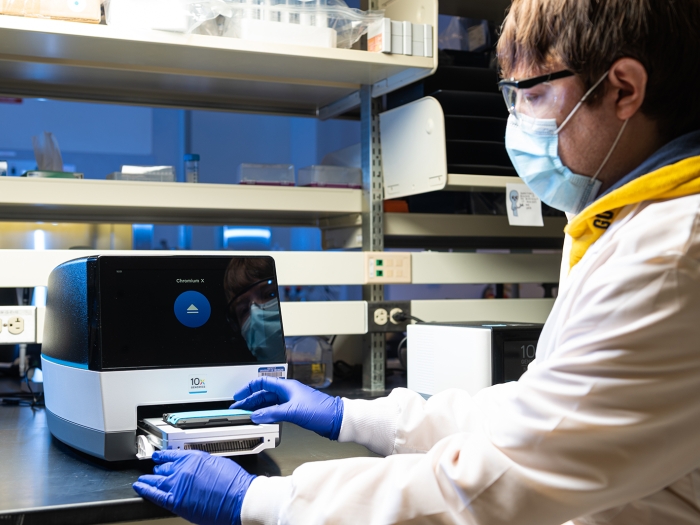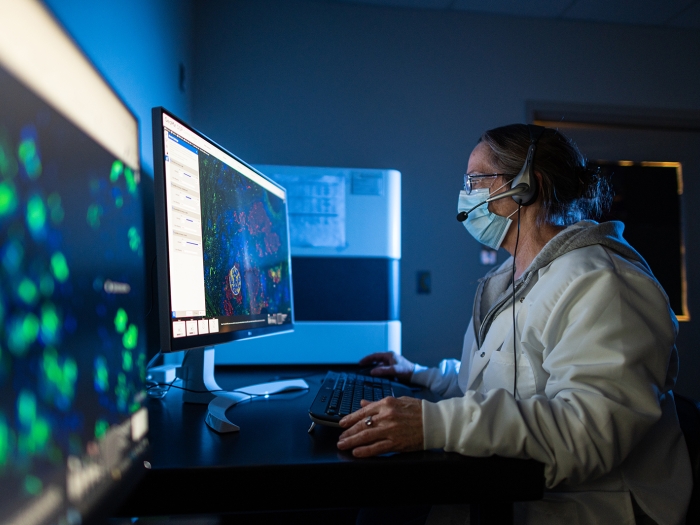
Facilitating research in cutting-edge fields of genetics and genomics by implementing complex technologies.
The Advanced Genomics Core is well-known for their “next-generation” sequencing (NGS), which has revolutionized research in virtually all biological fields in the past decade. By housing NGS and companion genomic technologies in a single facility, we provide centralized expertise in advanced methods that enables all researchers to effectively exploit them for making scientific discoveries.
“The BRCF has been an incredible partner in our sequencing efforts from large-scale bulk sequencing to boutique full-length splice isoform studies of single-cell data sets. And all this in times of a pandemic and for studies of our patients with COVID associated AKI.”

General information for recommended input requirements and submission logistics.

Explore the storage and support options available when dealing with many terabytes of data.

Information about Sequencing, Single Cell, and Spatial Platforms.

Advanced Genomics Core pricing tool for estimating the cost of projects.
The AGC has been an excellent provider for our team’s sequencing needs including support for library preparations and sequencing. Because of these core services, we have been able to focus our effort on validation approaches and understanding the biological significance of sequencing-based discoveries.
The Advanced Genomics Core is happy to provide letters of support for grant applications. Email [email protected] to request a letter. Please include your name and affiliation, the type of application you are submitting, the title of your proposal, the core services you will be using, and a brief description of your project.
The University of Michigan operates the Biomedical Research Core Facilities, a University-wide resource that provides state-of-the-art technical services for UM researchers. These Core Facilities include: Advanced Genomics, Epigenomics, Bioinformatics, Transgenic Mouse Production, Embryonic Stem Cell Lab, Vector Core, Flow Cytometry Core, Molecular Biology Stores, and others.
The Advanced Genomics Core is a shared resource that provides advanced molecular technologies to support the full range of biomedical research conducted at the University of Michigan. The core was created in 1993 as an automated Sanger sequencing facility, and since then has established an excellent reputation for high quality and cost-effective service work. Over the years, we have dramatically expanded to include a wide variety of other genetic analysis services, including microarray systems (Illumina), single cell platforms (10x Genomics, Takara, Parse Biosciences, MissionBio), spatial platforms (GeoMx, Visium with CytAssist, Curio Seeker, and Xenium), and next generation sequencing (Illumina, Oxford Nanopore). We prepare more than 10,000 libraries a year and accommodate more than 2400 Single-Cell samples per year. The Core occupies over 10,000 square feet of pre- and post-PCR laboratory space and employs 26 FTEs to provide researchers with access to next-generation sequencing, genotyping, epigenetic, and gene expression analysis technologies on a recharge basis. Our people and processes are supported by a custom Laboratory Information Management System (LIMS), providing sample tracking, data Q/C, data processing, and automated data distribution. Computational and informatics support is provided by a dedicated IT staff of five full-time individuals.
Major Core equipment:
| Major Core Equipment | ||
| ABI QuantStudio 3K | Illumina NovaSeq X Plus | Qiagen QiaCube robotic prep (2) |
| ABI QuantStudio 12K Flex | LabChip GX Touch | Qubit 2.0 fluorimetric system |
| Agilent 2200 TapeStation | Leica CM1860 Cryostat | Qubit 4.0 fluorimetric system |
| Agilent 4200 TapeStation | Life Technologies Countess II cell counter | Qubit Flex fluorimetric system (2) |
| Agilent Bioanalyzer 2100 (3) | Low-speed tabletop centrifuges (numerous) | Sage BluePippin preparative PFGE (2) |
| Biological Safety Cabinets (3) | LUNA Fx7 Automated Cell Counter | Savant speed-evaporator (2) |
| Covaris ML230 DNA fragmentation system | MilliQ IQ-7000 Water Purification System | Tabletop microfuges (numerous) |
| Eppendorf EpMotion 5075 robot (2) | MissionBio Tapestri | Tecan Freedom EVO robotic workstation |
| gentleMACS Octo Dissociator with Heaters | Molecular Dynamics 96-well Fluorimeter | Thermal Cyclers (numerous) |
| High Speed microplate shaker (2) | nanoString GeoMx DSP | RWD Cryotome |
| Hybridization ovens (5) | Nanodrop ND1000 spectrophotometer (2) | UV PCR workstation hoods (2) |
| Illumina iScan system with Autoloader 2X | Olympus BX51 Epifluorescence Microscope | 10x Genomics Chromium System (2) |
| Illumina MiSeq sequencer (2) | 10x Genomics Chromium X System (2) | Illumina NextSeq 2000 |
| 10x Genomics CytAssist System (3) | Illumina NovaSeq 6000 | ONT PromethION 24 |
| 10x Genomics Xenium | Nikon Eclipse Ti2 |
The Advanced Genomics Core employs multiple mechanisms to ensure rigor and reproductivity in the daily operations of the facility. All samples are subjected to quality assessment upon entering the facility and customers are provided with guidelines for determining if they want to proceed with downstream assays. Core methods are well documented in the form of standard operating procedures (SOPs) and assays include appropriate positive and negative controls and contain at least one quality control step to verify success of the method. AGC equipment are subjected to instrumentation management plans, which include preventative maintenance as recommended by the manufacturer. Before release of files, data are subjected to quality control steps, which include verifying that instrumentation performance met manufacturers specification and initial data processing steps that ensure assay reagents worked as expected.
Next generation sequencing projects have lots of options, our website tool is excellent for playing with project parameters and obtaining estimates.
The Advanced Genomics Core holds weekly office hours for project planning and consultation. Please reach out to us if you would like to discuss how our technologies can be applied to your area of research.
Most core services use advanced technologies that are both complex and expensive. While we offer these in a fee-for-service format that typically does not warrant authorship, we appreciate the expertise our AGC Research Specialists bring to the University of Michigan Research Enterprise. Please support our team by acknowledging AGC services in your publication with a sentence such as the following: “Library prep and next-generation sequencing was carried out in the Advanced Genomics Core at the University of Michigan.”
For studies that include our single cell or spatial transcriptomics services, please also add the following: Research reported in this publication was supported by the National Cancer Institutes of Health under Award Number P30CA046592 by the use of the following Cancer Center Shared Resource: Single Cell and Spatial Analysis Shared Resource.
- Requests for processing samples not specified at the time of the submission may require additional turnaround time and fees above initial estimates.
- The core does not return unused samples or portions of samples. Only submit aliquots to the core; do not submit your entire sample.
- All samples provided by the user will be subjected to quality control. In the case that the user elects to proceed with samples not meeting minimum core requirements (i.e. fail quality check), the core is not responsible for the quality of the preps or data originating from those samples.
- The user is responsible for downloading all data files provided by the core. The AGC maintains a copy of all data generated for 180 days (~ 6 months). While the AGC may be able to replace lost files after 180 days, it is not a general expectation and will result in additional charges.
- The user agrees to include/acknowledge the use of AGC services in any publications that result from this work.
- The user is in compliance with all institutional, state and federal rules governing the performance of research involving human or animal samples.
BRCF’s Advanced Genomics Core made a huge impact on our research when we were at Michigan. This is something that we miss greatly as we moved to the University of Texas-Houston last summer. The BRCF Core is a tremendous asset of the Michigan research community, and you do amazing work!
University of Michigan
2800 Plymouth Rd.
Ann Arbor, MI 48109-2800










